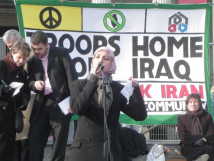 Jack Straw’s comments on veils have been good news for the owner of The Hijab Centre in the MP’s constituency of Blackburn. Nadeem Siddiqui tells me he is selling more veils than he did before his local MP made his controversial remarks.
Jack Straw’s comments on veils have been good news for the owner of The Hijab Centre in the MP’s constituency of Blackburn. Nadeem Siddiqui tells me he is selling more veils than he did before his local MP made his controversial remarks.
Mr Siddiqui is the largest seller of veils in the area. “I used to sell two or three a week but now I am selling five to six. They are mainly being bought by young, British-born Muslim women,” he said. “These women are experimenting with the wearing of the niqab. Their mothers often do not cover themselves but they seem to want to do it.”
It is probably not the impact that Mr Straw intended when he wrote in his local newspapers that he felt uncomfortable when dealing face to face with veiled women. The majority of Muslims condemned Mr Straw over his comments. One month later, they are still upset.
“I voted for Mr Straw at the last election” says Mr Siddiqui. “I’m now reconsidering my support for him. Most of the people around here are doing the same because of what he said about the veil”.
British Muslims do not accept the argument that veiled women contribute to segregation or are a barrier to integration. Instead they feel they are being deliberately stigmatised as a problem community and are fearful of the future.

 This focus on the niqab is a distraction
This focus on the niqab is a distraction Another plug for the provocateur Ayaan Hirsi Ali, currently pursuing her career in a right-wing US think-tank. She offers the following helpful contribution to the “debate” over the veil:
Another plug for the provocateur Ayaan Hirsi Ali, currently pursuing her career in a right-wing US think-tank. She offers the following helpful contribution to the “debate” over the veil: The Archbishop of Canterbury prompted anger yesterday by putting Muslim veils on an equal footing with Christian crosses.
The Archbishop of Canterbury prompted anger yesterday by putting Muslim veils on an equal footing with Christian crosses. Britain and Australia are not the only countries where debate is raging over the Islamic veil. In Italy, the issue burst into the news this week after the interior ministry ordered round-the-clock police protection for an MP, believing she had been threatened for expressing her views on the subject.
Britain and Australia are not the only countries where debate is raging over the Islamic veil. In Italy, the issue burst into the news this week after the interior ministry ordered round-the-clock police protection for an MP, believing she had been threatened for expressing her views on the subject.